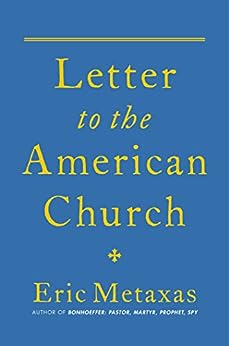
Eric Metaxas
Reviewed by: Alan D. Strange
Letter to the American Church, by Eric Metaxas. Salem, 2022. Hardcover, 139 pages, $19.99 (Amazon). Reviewed by OP minister and professor Alan D. Strange.
While there is much in Metaxas with which many confessional Christians would agree—he calls for pulpit opposition to abortion and same-sex marriage, for instance—there is much else that he calls for that is, at best, uncertain, particularly with respect to the “need” of the institutional church to be explicitly political. For instance, take Metaxas’s curious call that we must not only fight “for justice,” which could mean many things, but that the church must also attempt to see “that our government enacts the will of the people” (77). The best reading of that is problematic for the institutional church—how does the church know “the will of the people” and, in any case, if such could be ascertained, why would it be the church’s business to seek to have the government “enact” it?
One suspects, given Metaxas’s known public commitments and actions regarding former President Trump, that enacting the will of the people may have something to do with the church speaking up in the case of a purported defective election so that the “real decision” of the people may be followed. How the church is supposed to ascertain such and why it is the church’s calling even to attempt to do so and to proclaim the “real winner” of an election is never disclosed. It’s hard to think that Trumpism doesn’t lurk in the back of his insistence that the church needs to step up and stop dodging its political obligations.
Metaxas’s point of departure throughout his call for the American church not to be politically silent is his analogy of the present church in this country with the German state church of the 1930s. Metaxas believes that the failure of the German church to confront National Socialism and Hitler parallels the modern church in its failure to confront abortion, same-sex marriage, and fluid genderism, as well as more directly political matters like COVID-governmental overreach and the thwarted will of the people (in elections and the like, presumably). Metaxas has elsewhere, in his biography on Bonhoeffer, wrongly constructed him as some sort of evangelical, which he decidedly was not, and wants to read our current history as replaying the history of Germany in the time leading up to and during the “thousand-year reign” of Hitler, which was mercifully cut short after twelve years; indeed, Bonhoeffer opposed Hitler, not only in print and pulpit but violently. It is hard to see that our present time is a replay of 1930s Germany, and Metaxas asserts it but does little to demonstrate the recurring pattern.
Metaxas is not wrong that the church should speak prophetically to the nation. It should proclaim not only the gospel but also the law, in all three of its uses. The second use of the law furnishes civil society with a legal pattern. Thus, the church can call upon the magistrate to rule righteously, even in accordance with natural law, if he refuses to hear biblical law, since the latter is fundamental to the former. The church, however, is never to give itself over to the merely political. Rather, the church as church is to distinguish itself from the world, while, at the same time, giving itself to the world. The church does this in carrying out its primary mission, its spiritual calling, of preaching the gospel of Jesus Christ. This is what the world truly needs.
April 21, 2024
5 Puritan Women: Portraits of Faith and Love
April 14, 2024
How to Read and Understand the Psalms
April 07, 2024
March 31, 2024
My Grandmother Is Praying for Me
March 24, 2024
March 17, 2024
Safeguards: Shielding Our Homes and Equipping Our Kids
March 10, 2024
© 2024 The Orthodox Presbyterian Church